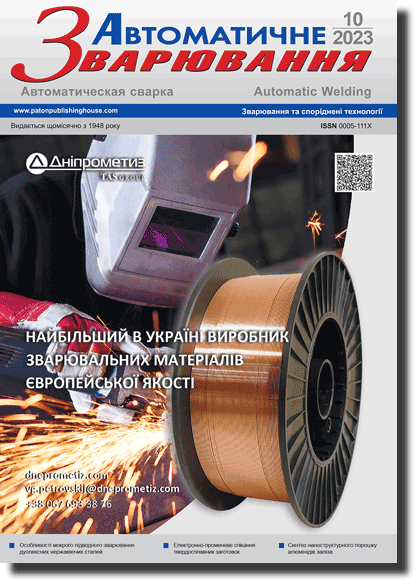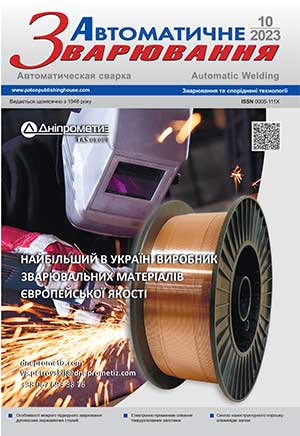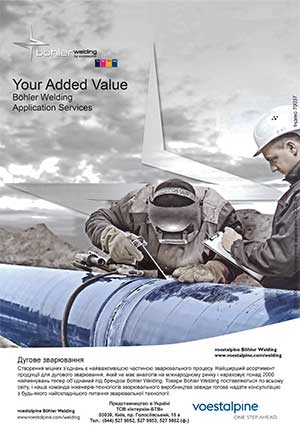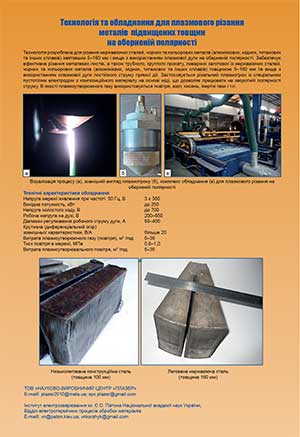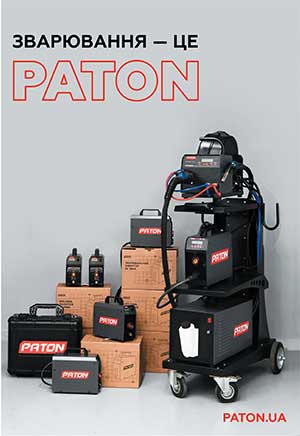| 2023 №10 (08) |
DOI of Article 10.37434/as2023.10.01 |
2023 №10 (02) |
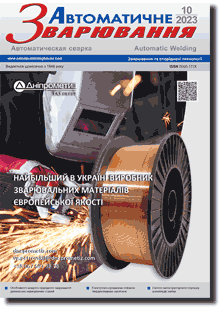
"Avtomatychne Zvaryuvannya" (Automatic Welding), #10, 2023, pp. 3-9
Structure and properties of welded joints of 13KhGMRB steel in pulsed-arc welding
O.A. Haivoronskyi, V.D. Poznyakov, S.L. Zhdanov, A.V. Zavdoveev, A.O. Maksymenko, A.M. Denysenko
E.O. Paton Electric Welding Institute of the NAS of Ukraine. 11 Kazymyr Malevych Str., 03150, Kyiv, Ukraine. E-mail: office@paton.kiev.uaThe results of studies on the structure formation in the welds and heat-affected-zone (HAZ) metal of a low-alloy thermally strengthened 13KhGMRB steel in a pulsed-arc welding, changes in mechanical properties and stress intensity factor in brittle fracture and resistance to cold and fatigue cracks formation are given. It was found that compared to stationary arc welding, in a pulsed-arc welding in the structure of welds and HAZ metal of joints, a larger number of hardening structures of bainite and martensite is formed. It was determined that regardless of the welding method, the values of strength (σ0.2 and σt) and ductility (δ5 and ψ) of metals are approximately at the same level while their ability to resist impact loads, especially at a test temperature -40 °C, in the case of pulsed-arc welding grows. In particular, it was determined that the values of impact toughness of the HAZ metal of welded joints produced using pulsed-arc welding are by 30 % higher compared to arc welding and amount to 108 J/cm2. I.e., the cold resistance of the weld metal is clearly increased. The resistance of weld and HAZ metals to brittle fracture is at a fairly high level (Kq ≥ 84 МPa√m). It was also established that due to an increase of welded joints in the HAZ metal produced using pulsed welding of hardening structures, the temperature of preliminary heating should be increased from 90 to 120 °C to avoid the formation of cold cracks. Instead, such welded joints have a higher resistance to fatigue cracks at cyclic bending load. 18 Ref., 1 Tabl., 7 Fig.
Keywords: low-alloy thermally strengthened steel, pulsed-arc welding, weld metal, HAZ, structure, mechanical properties, cold cracks, brittle fracture, fatigue resistance
Received: 13.07.2023
References
1. Lobanov, L.M., Poznyakov, V.D., Pivtorak, V.I. et al. (2009) Residual stresses in welded joints of high-strength steels. Fiz.- Khimich. Mekhanika Materialiv, 6, 13-22 [in Ukrainian] https://doi.org/10.1007/s11003-010-9242-z2. Berdnikova, O.M. (2021) Structural criteria of strength and crack resistance of high-strength steels and their welded joints. Suchasna Elektrometal., 2, 47-53 [in Ukrainian]. https://doi.org/10.37434/sem2021.02.07
3. Palani, P.K., Murugan, N. (2006) Selection of parameters of pulsed current gas metal arc welding. J. of Materials Processing Technology. 172, 1-10. https://doi.org/10.1016/j.jmatprotec.2005.07.013
4. Ghosh, P.K. (2017) Pulse current gas metal arc welding. New York, Springer. https://doi.org/10.1007/978-981-10-3557-9
5. Rimsky, S.T., Svetsinsky, V.G., Shejko, P.P. et al. (1993) Pulsed arc consumable electrode welding in argon-CO2 mixture of low-alloy steels. Avtomatich. Svarka, 2, 38-41 [in Russian].
6. Zhernosekov, A.M., Andreev, V.V. (2007) Pulsed metal arc welding (Review). The Paton Welding J., 10, 40-43.
7. Zhernosekov, A.M. (2012) Tendencies in development of control of metal transfer processes in shielding gases (Review). The Paton Welding J., 1, 29-33.
8. Zhernosekov, А.М., Fedorchuk, V.Ye., Kysla, H.P. et. al. (2022) Influence of the shape of pulses of welding currents on the properties of joints of aluminum alloys. Materials Science, 58(2), 157-164. https://doi.org/10.1007/s11003-022-00644-4
9. Potapievsky, A.G. (2007) Shielded-gas metal arc welding. Pt 1. Welding in active gases. 2nd Ed. Kyiv, Ekotekhnologiya [in Russian].
10. Essers, W.G., Van Gompel, M.R.M. (1984) Arc control with pulsed GMA welding. Weld. J., 63, 26-32.
11. Lashchenko, G.I. (2006) Methods of metal arc welding. Kyiv, Ekotekhnologiya [in Russian].
12. Voropaj, N.M., Ilyushenko, V.M., Lankin, Yu.N. (1999) Features of pulsed arc welding with synergetic control of mode parameters. Avtomatich. Svarka, 6, 26-32 [in Russian].
13. Pal, K., Pal, S.K. (2011) Effect of pulse parameters on weld quality in pulsed gas metal arc welding: a review. J. of Materials Engineering and Performance, 20(6), 918-931. https://doi.org/10.1007/s11665-010-9717-y
14. Yousefieh, M., Shamanian, M., Saatchi, A. (2011) Optimization of the pulsed current gas tungsten arc welding (PCGTAW) parameters for corrosion resistance of super duplex stainless steel (UNS S32760) welds using the Taguchi method. J. Alloys Compd., 509, 782-788. https://doi.org/10.1016/j.jallcom.2010.09.087
15. Goyal, V.K., Ghosh, P.K., Saini, J.S. (2009) Analytical studies on thermal behaviour and geometry of weld pool in pulsed current gas metal arc welding. J. of Materials Processing Technology, 209(3), 1318.-1336. https://doi.org/10.1016/j.jmatprotec.2008.03.035
16. Palani, P.K., Murugan, N. (2006) Selection of parameters of pulsed current gas metal arc welding. J. of Materials Processing Technology, 172, (1), 10. https://doi.org/10.1016/j.jmatprotec.2005.07.013
17. Zavdoveev, A.V., Poznyakov, V.D. Rogante, M. (2020) Features of structure formation and properties of joints of S460M steel made by pulsed-arc welding. The Paton Welding J., 6, 9-13. https://doi.org/10.37434/tpwj2020.06.02
18. Zavdoveev, A., Poznyakov, V., Kim, H.S. (2020) PC-GMAW effect on the welding thermal cycle and weld metal geometry for high strength steels. Int. J. of Engineering and Safety Sciences, 1, 5-16. https://doi.org/10.16926/ijess.2020.01.01
Advertising in this issue:
The cost of subscription/purchase order journals or individual articles
| Journal/Currency | Annual Set | 1 issue printed |
1 issue |
one article |
| TPWJ/USD | 384 $ | 32 $ | 26 $ | 13 $ |
| TPWJ/EUR | 348 € | 29 € | 24 € | 12 € |
| TPWJ/UAH | 7200 UAH | 600 UAH | 600 UAH | 280 UAH |
| AS/UAH | 1800 UAH | 300 UAH | 300 UAH | 150 UAH |
| AS/USD | 192 $ | 32 $ | 26 $ | 13 $ |
| AS/EUR | 180 € | 30 € | 25 € | 12 € |
| SEM/UAH | 1200 UAH | 300 UAH | 300 UAH | 150 UAH |
| SEM/USD | 128 $ | 32 $ | 26 $ | 13 $ |
| SEM/EUR | 120 € | 30 € | 25 € | 12 € |
| TDNK/UAH | 1200 UAH | 300 UAH | 300 UAH | 150 UAH |
| TDNK/USD | 128 $ | 32 $ | 26 $ | 13 $ |
| TDNK/EUR | 120 € | 30 € | 25 € | 15 € |
AS = «Automatic Welding» - 6 issues per year;
TPWJ = «PATON WELDING JOURNAL» - 12 issues per year;
SEM = «Electrometallurgy Today» - 4 issues per year;
TDNK = «Technical Diagnostics and Non-Destructive Testing» - 4 issues per year.




